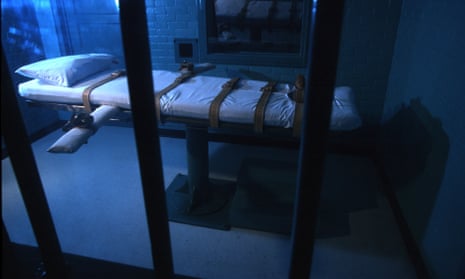Yosselyn Alfaro was celebrating her 21st birthday at a friend’s apartment when the bullet went through her brain. Two 17-year-olds, Daniel Munoz and Veronica Hernandez, also died after shots to the head.
Two others were injured. One held his mutilated jaw in place so he could tell the authorities who did it: Jonathan Sanchez.
The 27-year-old had a string of previous arrests. Prosecutors alleged that at the time of the murders two years ago, he was a gang member on a drug binge who sent threatening text messages to a man who lived at the Peppermill Place complex in north-west Houston. Then he turned up, talked his way in and started shooting.
In the county that metes out more completed death sentences than any other in the US, in the state that executes more people than anywhere else in the nation, it seemed obvious that prosecutors would seek the death penalty for such a horrific crime and almost inevitable that they would get it.
Yet, as the Houston Chronicle reported, the jury that convicted Sanchez of capital murder last week opted to spare him from a lethal injection. He was sentenced to life without parole. It was an outcome at odds with Texas’s well-earned reputation.
On Wednesday, Raphael Holiday is set to become the 531st Texas inmate executed since 1976, and the 13th this year, for starting a house fire that killed three young girls, including his one-year-old daughter.
Some 124 offenders have been executed after convictions in Harris County, which includes Houston. If Harris were a state it would be second in total executions, behind Texas and 12 deaths ahead of Oklahoma.
Yet no one has been sentenced to death in Harris County this year. Across Texas there have been only three death sentences in 2015, and the first came as late as October. The previous low in a calendar year was eight.
“We now have more cases this year where jurors rejected the death penalty than where they imposed it,” said Kristin Houlé, executive director of the Texas Coalition to Abolish the Death Penalty.
“I think it’s the culmination of several things,” said Tim Cole, a former district attorney in Texas who tried death penalty cases. Cole believes that the rising number of DNA-based exonerations has made jurors more cautious and sceptical, that the introduction of a life without parole option for capital cases in 2005 has had a major effect, and prosecutors are seeking death less often.
“I think that it is reflective of the change in attitude,” Cole said of Sanchez’s life sentence. “About two or three years ago, I began to detect a difference.” While polls show a majority of Texans are still in favour of the death penalty, Cole suggested that many would be more circumspect if they found themselves on a jury. He pointed to the case of Gabriel Armandariz, who was sentenced to life imprisonment in March for strangling his two young sons near Fort Worth, though prosecutors had sought death.
“Does killing Gabriel make you feel better? Does it make the small town where it happened say, ‘Yeah, we killed that sorry SOB?’ What good is more death?” his attorney asked the jury during closing arguments.
While Texas prosecutors will not shirk from asking for death sentences for the most egregious murders, Cole said, their risk-v-reward calculations have evolved.
“If you seek death and you don’t get it, you’ve just spent months and perhaps millions on a case you could have [quickly] pled to a life sentence,” he said. And with capital punishment no longer a core issue for voters, elected officials worry less about seeming soft on crime if they choose to seek life without parole instead.
“Texas continues to execute more people than any other state, but in many respects the number of executions in the state is misleading. It reflects death sentences that were imposed many years ago,” said Robert Dunham, executive director of the Death Penalty Information Center.
“In fact there has been a substantial reduction in new death sentences in Texas, a reduction that suggests the death penalty is in decline there as well as elsewhere in the country.”
Texas has also improved the quality of its legal representation for indigent defendants, Dunham said – though court documents indicate that Holiday tried to replace his attorneys after they said that last-ditch attempts to halt his death would be futile.
Holiday and the Georgia inmate Marcus Johnson, scheduled to die on Thursday, are likely to be the last two executions in 2015. That would leave the nation with 27 executions this year: the fewest since 1991, down from 35 last year and the modern-era high of 98 in 1999, according to the Death Penalty Information Center.
It will be the seventh successive year that the number of executions has declined or remained level.
Six states have carried out executions this year, compared with 13 in 2011. The number of stays of execution has grown, reflecting legal challenges and dwindling drug supplies that have seen states including Texas resort to desperate and dubious measures.
“While Texas has ultimately been able to obtain the drugs to execute people, it is feeling the pinch from the pharmaceutical boycott,” Dunham said.

Comments (…)
Sign in or create your Guardian account to join the discussion